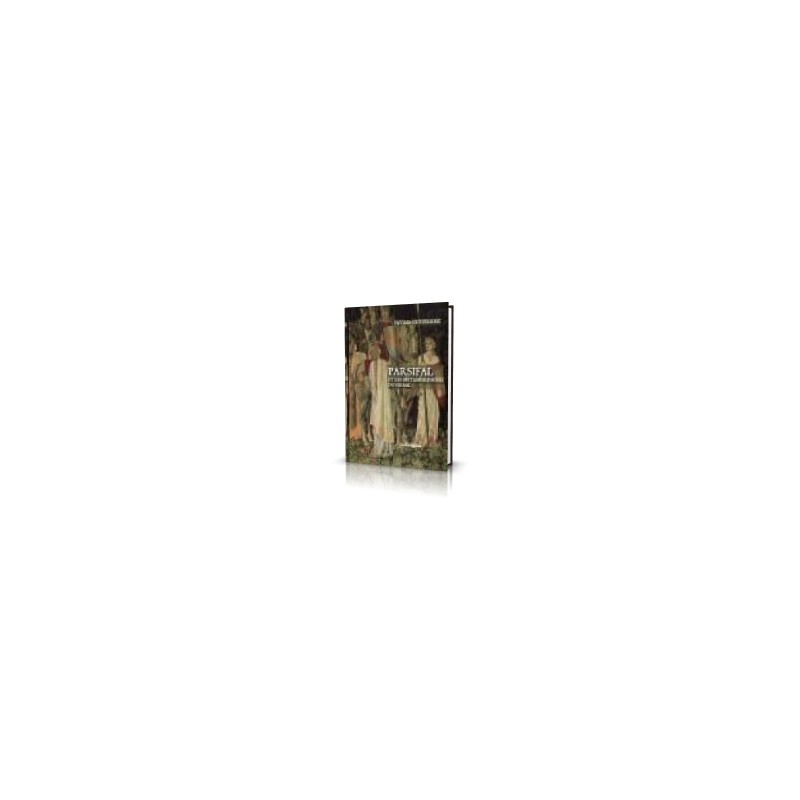



PARSIFAL ET LES METAMORPHOSES DU GRAAL - FATIMA GUTIERREZ
Ouvrage en français, 17cm X 24 cm sur papier ivoire, 188 pages
Raconter l’histoire du Graal, c’est raconter celle de l’Homme, avec ses mythes, ses légendes, son culte et son sang sacré.
Dans cet ouvrage, en s’appuyant sur l’œuvre de Richard Wagner, œuvre d’art total s’il en est, le professeur Fátima Gutiérrez explore les diverses versions de la légende du Graal et montre que l’opéra Parsifal, qui s’appuie sur des textes médiévaux (Chrétien de Troyes, les romans en prose, l’œuvre de Wolfram von Eschenbach...), est une synthèse exceptionnelle, toujours actuelle, entre mythes, histoire et réalités vécues, une vraie matrice de notre imaginaire occidental. Le lecteur trouvera dans cette étude du dernier opéra de Wagner nombre de clefs de lecture permettant de mieux comprendre et de mieux goûter l’ensemble de la production d’un auteur foisonnant et complexe quand Fátima Gutiérrez nous ouvre, dans le même temps, aux mystères du Graal. (Georges Bertin)
Fátima Gutiérrez est professeur de littérature française et théorie de la littérature à l’Université Autonome de Barcelone où elle a fondé le GREF (Groupe de Recherches sur Structuralisme Figuratif). Spécialiste internationalement reconnue de Wagner et de théorie de imaginaire, elle appartient depuis sa fondation au Centre international de Recherches sur l’Imaginaire fondé par le regretté professeur Gilbert Durand, dont elle fut une proche collaboratrice. Un de ses derniers ouvrages en langue espagnole Mitocritica (éd Milenio, 2012) présente une synthèse qui fait autorité dans les études sur le symbolisme et l’imaginaire. Son dernier ouvrage publié Tristán e Isolda. De la leyenda celta al mito wagneriano (éd Antígona, 2014) reprend l’éternelle histoire fondatrice du mythe de l’amour en Occident, selon Rougemont.
To tell the story of the Grail is to tell that of Man, with his myths, his legends, his cult and his sacred blood.
In this work, drawing on the work of Richard Wagner, a work of total art if ever there was one, Professor Fátima Gutiérrez explores the various versions of the legend of the Grail and shows that the opera Parsifal, which s ‘based on medieval texts (Chrétien de Troyes, prose novels, the work of Wolfram von Eschenbach ...), is an exceptional synthesis, always current, between myths, history and lived realities, a real matrix of our imagination western. The reader will find in this study of Wagner’s last opera a number of keys to reading that allow them to better understand and better taste the whole production of an abundant and complex author when Fátima Gutiérrez opens us, at the same time, to the mysteries. of the Grail. (Georges Bertin)
Fátima Gutiérrez is professor of French literature and theory of literature at the Autonomous University of Barcelona where she founded the GREF (Research Group on Figurative Structuralism). An internationally recognized specialist in Wagner and the theory of the imaginary, she has belonged since its foundation to the International Center for Research on the Imaginary founded by the late Professor Gilbert Durand, of which she was a close collaborator. One of his last Spanish-language works Mitocritica (ed Milenio, 2012) presents an authoritative synthesis in studies of symbolism and the imaginary. His last published work Tristán e Isolda. De la leyenda celta al mito wagneriano (ed Antígona, 2014) takes up the eternal founding story of the myth of love in the West, according to Rougemont.
Contar la historia del Grial es contar la del Hombre, con sus mitos, sus leyendas, su culto y su sangre sagrada.
En esta obra, basándose en la obra de Richard Wagner, una obra de arte total si alguna vez hubo una, la profesora Fátima Gutiérrez explora las diversas versiones de la leyenda del Grial y muestra que la ópera Parsifal, que se basa en textos medievales (Chrétien de Troyes, novelas en prosa, obra de Wolfram von Eschenbach ...), es una síntesis excepcional, siempre actual, entre mitos, historia y realidades vividas, una verdadera matriz de nuestra imaginación occidental. El lector encontrará en este estudio de la última ópera de Wagner una serie de claves de lectura que le permitirán comprender y saborear mejor toda la producción de un autor abundante y complejo cuando Fátima Gutiérrez nos abre, al mismo tiempo, a los misterios. del Grial. (Georges Bertin)
Fátima Gutiérrez es profesora de literatura francesa y teoría de la literatura en la Universitat Autònoma de Barcelona, donde fundó el GREF (Grupo de Investigación en Estructuralismo Figurativo). Especialista reconocida internacionalmente en Wagner y la teoría del imaginario, ha pertenecido desde su fundación al Centro Internacional de Investigación sobre el Imaginario fundado por el fallecido profesor Gilbert Durand, del que fue estrecha colaboradora. Una de sus últimas obras en español Mitocritica (ed. Milenio, 2012) presenta una síntesis autorizada en estudios del simbolismo y el imaginario. Su último trabajo publicado Tristán e Isolda. De la leyenda celta al mito wagneriano (ed Antígona, 2014) retoma la eterna historia fundacional del mito del amor en Occidente, según Rougemont.